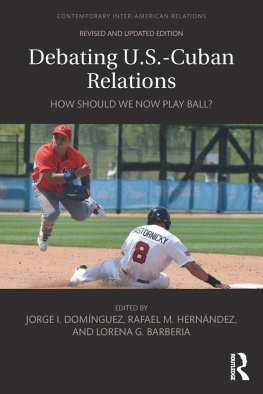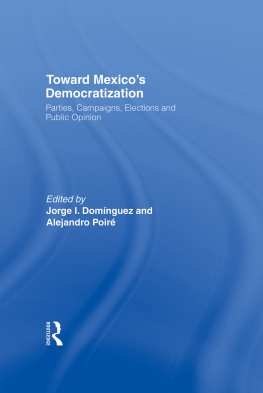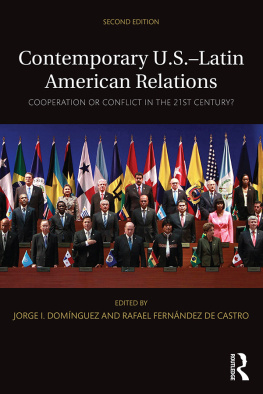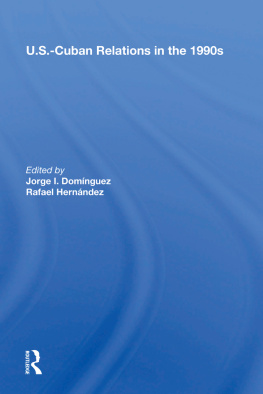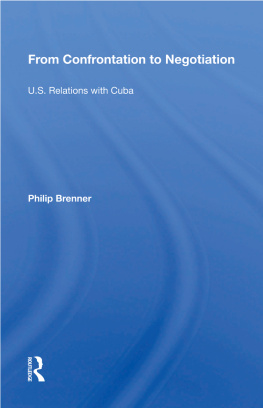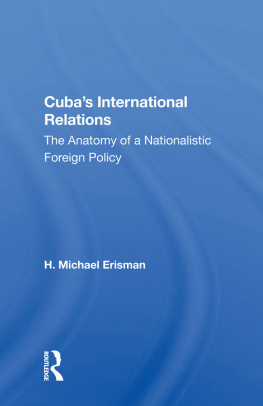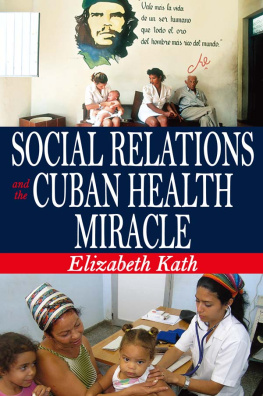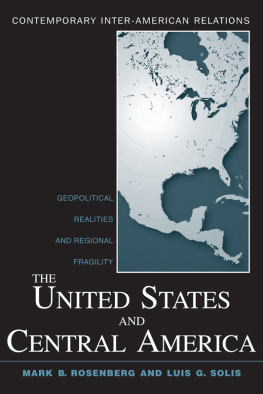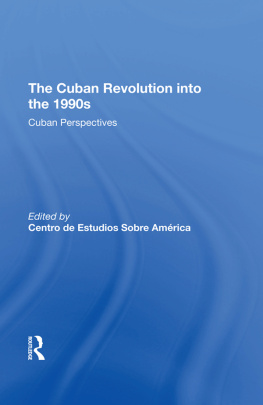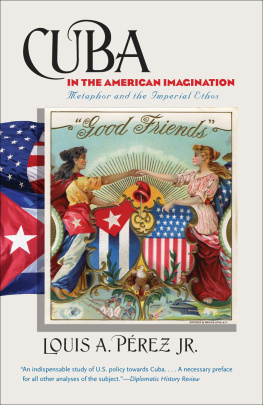DEBATING U.S.-CUBAN RELATIONS
The boundary between Cuba and the United States has become more and more porous, as have those with Latin America and the Caribbean. Never in the past half-century has Cubas leadership or its social and political fabric been so exposed to the influence of the outside world. In this book, an all-star cast of experts critically address the recent past and present in U.S.-Cuban relations in their full complexity and subtlety to develop a perspective on the evolution of the conflict and an inventory of forms of cooperation. This much needed approach provides a way to answer the questions what has been ? and what is ? while also thinking seriously about what if ?
To illustrate the most significant areas of U.S.-Cuban relations in the contemporary era, this newly updated edition of Debating U.S.-Cuban Relations adds six more themes to the study of this complex relationship: political, security, economic, and cultural/academic issues; the triangular relations of the United States, Cuban, and Europe; and the politics of Cuban migration/emigration. Each topic is represented by perspectives from both Cuban and non-Cuban scholars, leading to a resource rich in insight and a model of transnational dialogue.
The future course of U.S.-Cuban relations will likely be more complex than in the past, not only because of the matrix of factors involved but also because of the number of actors. Such a multiplicity of domestic, regional, and global factors is unique; it includes the rise to power of new administrations in both countries since 2008. Ral Castro became president of Cuba in February 2008 and Barack Obama was inaugurated president of the United States in January 2009. And it will feature the inauguration of a new president of the United States in January 2017 and a new president of Cuba, likely in February 2018.
Jorge I. Domnguez is the Antonio Madero Professor for the Study of Mexico and former Vice Provost for International Affairs at Harvard University. He is a past President of the Latin American Studies Association.
Rafael M. Hernndez is the Chief Editor of Temas, Cubas leading magazine in the social sciences. He has been Professor at the University of Havana; Director of U.S. studies at the Centro de Estudios sobre Amrica; and a Senior Research Fellow at the Instituto Juan Marinello in Havana (19962008). He has published on Cuban and U.S. policies, inter-American relations, international security, migration, and Cuban culture, civil society, and politics.
Lorena G. Barberia is an Associate Professor in the Department of Political Science at the University of So Paulo, Brazil. Her primary research and teaching interests are political economy, comparative politics, and political methodology. Much of her recent work is aimed at analyzing redistributive politics in Latin America.
For the third time, Dominguez, Hernandez, and Barberia have reassembled their all-star team of Cuban and U.S. scholars to reflect on the dynamics of bilateral relations leading up to and following the December 17, 2014 decision to normalize U.S.-Cuban relations.
William LeoGrande, American University, USA
The editors have assembled a five-star cast of analysts, both Cuban and non-Cuban, to explore and update the long-term dynamics of U.S.-Cuban relations. Given the recent improvement in those relations, these analyses can be seen as a significant resource in both policy-making and the larger public arenas.
H. Michael Erisman, Indiana State University, USA
Wise old Solomon got it wrong. There is something new under the sun, and its called U.S.-Cuban relations in the twenty-first century. The first edition of this classic book appeared in the midst of a bitter Cold War and the real threat of armed conflict between Cuba and the U.S. Full Stop. Fast forward to 2017. Surreally, Cuba and the U.S. have normalized relations. The American and Cuban presidents have gone to a baseball game together in Havana and eaten popcorn from the same box. Its a whole new ball game! The editors and authors of this new edition are our very best guides as to how the game should be played under the new circumstances.
James G. Blight, Balsille School of International Affairs, Canada
The updated edition of Debating U.S.-Cuban Relations comes at a propitious moment for students and policy makers to appreciate the complexity of normalization between the United States and Cuba since they re-established diplomatic relations. As with the excellent first edition, this volume enables readers in both countries to engage key issues empathetically, because the authors are among the most knowledgeable in each country. The book provides both cogent broad analyses and useful current information about both countries policies and interests.
Philip Brenner, American University, USA
Other Titles in the Contemporary Inter-American Relations Series edited by Jorge I. Domnguez and Rafael Fernndez de Castro
The United States and Brazil:
A Long Road of Unmet Expectations
Mnica Hirst, with an essay by Andrew Hurrell
The United States and the Caribbean:
The Transformation of Hegemony and Sovereignty in the Post Cold War Era
Anthony P. Maingot and Wilfredo Lozano
The United States and Central America:
Geopolitical Realities and Regional Fragility
Mark B. Rosenberg and Luis G. Sols
The United States and Mexico, Second Edition:
Between Partnership and Conflict
Jorge I. Domnguez and Rafael Fernndez de Castro
Contemporary U.S.-Latin American Relations
Cooperation or Conflict in the 21st Century?
Jorge I. Domnguez and Rafael Fernndez de Castro
The United States and Cuba:
Intimate Enemies
Marifeli Prez-Stable, with an essay by Ana Covarrubias
Debating U.S.-Cuban Relations:
Shall We Play Ball?
Jorge I. Domnguez, Rafael Hernndez and Lorena Barberia
U.S.-Venezuela Relations since the 1990s:
Coping with Mid-Level Security Threats
Javier Corrales and Carlos A. Romero
Debating U.S.-Cuban Relations
How Should We Now Play Ball? Revised and Updated Edition
Jorge I. Domnguez, Rafael M. Hernndez, and Lorena G. Barberia
DEBATING U.S.-CUBAN RELATIONS
How Should We Now Play Ball?
Revised and Updated Edition
Edited by Jorge I. Domnguez, Rafael M. Hernndez, and Lorena G. Barberia
First published 2017
by Routledge
711 Third Avenue, New York, NY 10017
and by Routledge
2 Park Square, Milton Park, Abingdon, Oxon OX14 4RN
Routledge is an imprint of the Taylor & Francis Group, an informa business
2017 Taylor & Francis
The right of Jorge I. Domnguez, Rafael M. Hernndez, and Lorena G. Barberia to be identified as the authors of the editorial material, and of the authors for their individual chapters, has been asserted in accordance with sections 77 and 78 of the Copyright, Designs and Patents Act 1988.
All rights reserved. No part of this book may be reprinted or reproduced or utilised in any form or by any electronic, mechanical, or other means, now known or hereafter invented, including photocopying and recording, or in any information storage or retrieval system, without permission in writing from the publishers.
Trademark notice: Product or corporate names may be trademarks or registered trademarks, and are used only for identification and explanation without intent to infringe.

